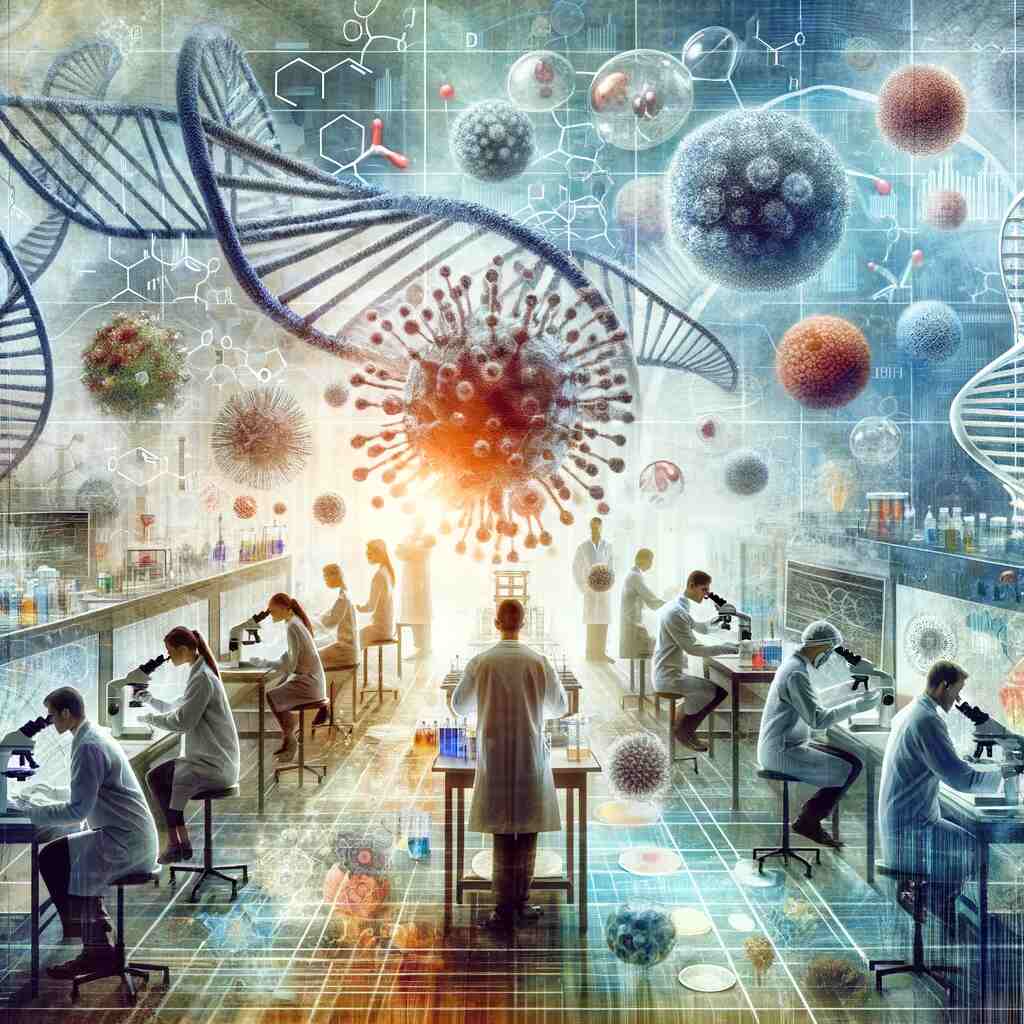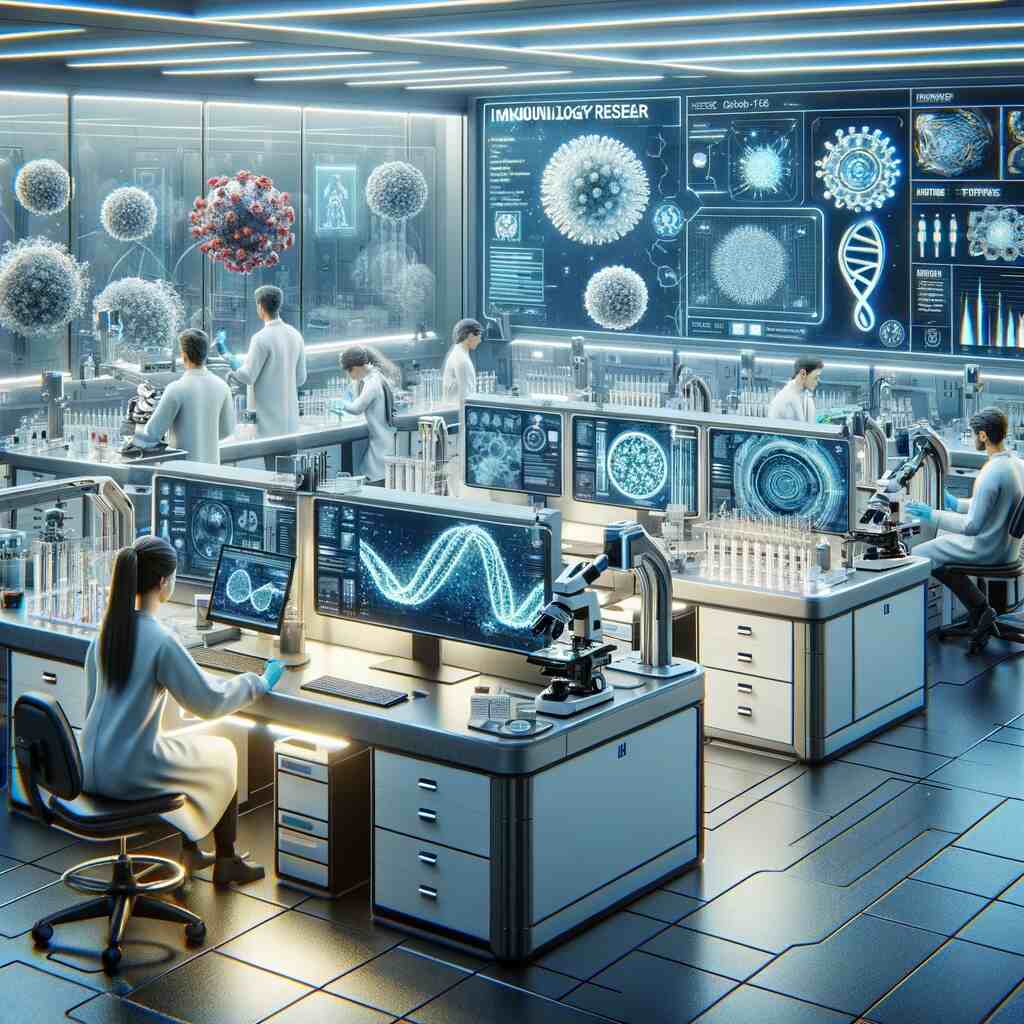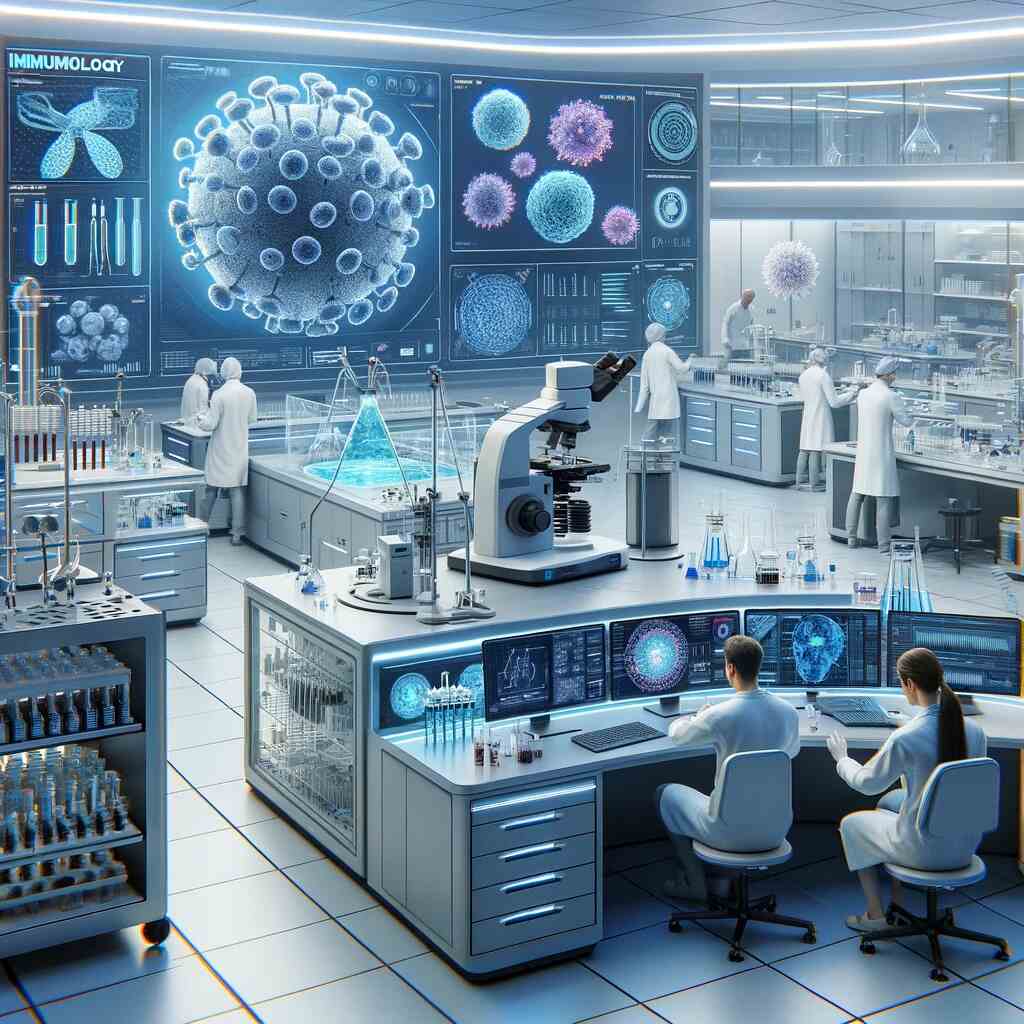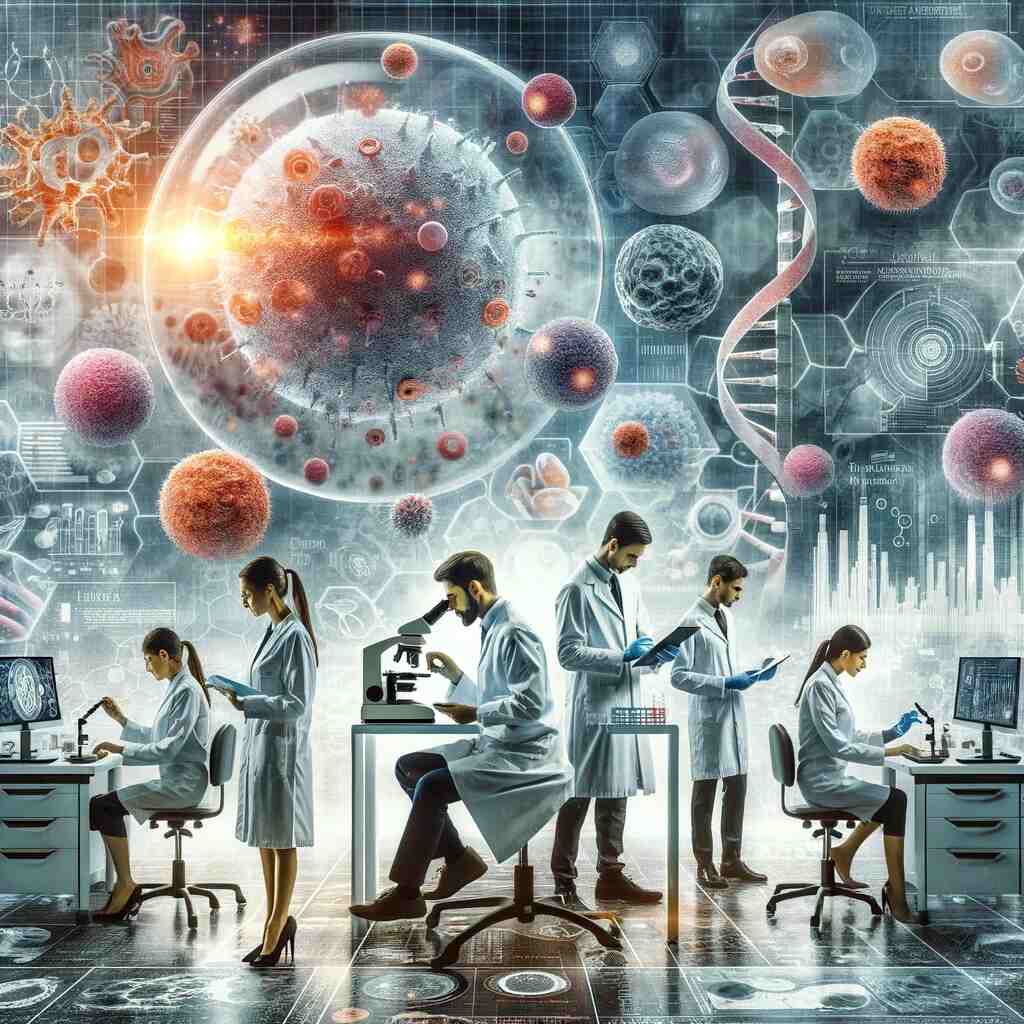Dive into the fascinating world of science immunology, uncovering the complexities and innovations in understanding our body’s defense mechanisms.
Introduction to Science Immunology
The realm of science immunology offers a window into the intricate and dynamic world of our immune system, a critical component of our health and well-being. This comprehensive guide aims to explore the depths of immunology, shedding light on its importance, developments, and the impact it has on our daily lives and the medical field.
Understanding the Immune System: A Cornerstone of Health
- The immune system is our body’s defense mechanism against infectious organisms and other invaders.
- Through a series of steps called the immune response, the immune system attacks organisms and substances that invade our systems and cause disease.
- Understanding this complex network of cells, tissues, and organs is crucial for comprehending how our bodies fight off diseases, and
- It serves as the foundation for advancements in medical treatments and preventive measures like vaccines.
The Evolution of Immunology
Immunology has evolved significantly over the centuries. From the early recognition of the body’s natural defense mechanisms to the development of vaccines and advanced therapies, the field has witnessed tremendous growth. This evolution reflects our deepening understanding of the immune system and its role in maintaining health and combating diseases.


Key Concepts and Terms in Immunology
To fully grasp the intricacies of immunology, it’s essential to understand some key concepts and terms.
This includes understanding antigens, antibodies, immune cells like lymphocytes and phagocytes, and
The distinction between innate and adaptive immunity.
Each of these plays a vital role in how the immune system functions and responds to threats.
The Immune Response: Innate vs. Adaptive Immunity
The immune response is a complex process involving various components of the immune system. Innate immunity is the body’s first line of defense and involves barriers like the skin and mucous membranes, as well as immune cells that provide a general defense. In contrast, adaptive immunity is more specific and involves a learned response to specific pathogens.
Mechanisms of Immune Response
Understanding the mechanisms of immune response, including how the body identifies and fights off pathogens, is crucial. This involves a series of steps that the immune system takes to identify and eliminate pathogens, including the activation of immune cells, production of antibodies, and the memory of past infections, which plays a crucial role in vaccinations.
Immunological Disorders: Autoimmune Diseases and Allergies
- Immunological disorders, such as autoimmune diseases and allergies, occur when the immune system doesn’t function as it should.
- Autoimmune diseases arise when the body’s immune system attacks its tissues, while allergies are the result of hypersensitive immune responses to harmless substances.
- Understanding these disorders is key to developing effective treatments and managing symptoms.
Autoimmune Diseases: Challenges and Treatments
Autoimmune diseases, such as rheumatoid arthritis, lupus, and type 1 diabetes, pose significant challenges due to their complex nature. Research continues to seek better understanding and treatments for these conditions, focusing on how to modulate the immune response to prevent the body from attacking itself.
Allergies and Hypersensitivities: Understanding and Managing
- Allergies are another form of immunological disorder where the immune system reacts excessively to substances like pollen, food, or medication.
- Understanding the mechanisms behind allergies and hypersensitivities is crucial for developing effective management and treatment strategies.
Vaccines and Immunology: A Triumph of Science


Vaccines represent one of the most significant triumphs in the field of immunology. They work by training the immune system to recognize and combat pathogens, without causing the disease itself. This section explores the history of vaccines, how they are developed, and their critical role in public health.
History and Development of Vaccines
The development of vaccines is a fascinating story of scientific endeavor and innovation. From the early smallpox vaccine to the rapid development of COVID-19 vaccines, the history of vaccination is a testament to the ingenuity and persistence of scientists and healthcare professionals.
How Vaccines Work: A Closer Look
Understanding how vaccines work is key to appreciating their role in health and disease prevention. Vaccines typically contain a component of the pathogen, such as a protein or a piece of its genetic material, which stimulates the immune system to recognize and remember the pathogen, preparing the body to fight future infections.
Current Trends in Immunology Research: Paving the Way for the Future
Immunology is a rapidly evolving field, with ongoing research leading to new discoveries and treatments. This section delves into the latest trends, breakthroughs, and future directions in immunological research.
Breakthroughs and Innovations in Immunology
- Recent years have seen significant breakthroughs in immunology, including advances in understanding
- the immune system’s role in various diseases, the development of new vaccines, and the emergence of novel immunotherapies.
- These innovations not only improve our understanding of the immune system but also pave the way for new treatment approaches.
Future Directions in Immunology Research
The future of immunology is bright, with research focusing on areas like personalized medicine, the role of the microbiome in immunity, and the development of more effective vaccines and therapies. These future directions hold the promise of transforming healthcare and improving outcomes for patients with immunological disorders.


Immunotherapy and Clinical Applications: A New Era in Medicine
Immunotherapy, which involves manipulating the immune system to treat diseases, represents a new era in medicine. This section discusses the advances in cancer immunotherapy, as well as the potential of immunological treatments for other diseases.
Advances in Cancer Immunotherapy
Cancer immunotherapy is one of the most exciting developments in the field. By harnessing the power of the immune system, these therapies offer new hope for cancer patients, with treatments like checkpoint inhibitors and CAR T-cell therapy showing promising results.
Immunological Treatments for Other Diseases
Beyond cancer, immunotherapy has potential applications in treating a wide range of diseases, from autoimmune disorders to infectious diseases. The exploration of these treatments is a dynamic area of research, offering new possibilities for patient care.
Diagnostic Techniques in Immunology: Tools for Understanding and Treatment
- Diagnostic techniques in immunology are crucial for identifying and managing immunological disorders.
- This section covers the laboratory methods and tests used in immunology,
- as well as the role of genomics in understanding immune-related diseases.
Laboratory Methods and Tests in Immunology
Laboratory Methods and Tests
The cornerstone of immunological diagnosis lies in a range of laboratory methods and tests. These techniques help identify immune deficiencies and monitor immune responses. From simple blood tests to advanced genomic profiling, these methods provide critical insights into the functioning of the immune system.
The Role of Genomics in Immunology
Genomic studies have revolutionized immunology, offering insights into genetic factors influencing immune responses. Understanding genetic variations can lead to personalized medical approaches, tailor-made to suit individual immunological needs.
The Microbiome and Immunology
Gut Health and Immunity
The human microbiome, particularly the gut flora, plays a significant role in shaping our immune responses. A healthy gut microbiome contributes to a robust immune system, influencing everything from nutrient absorption to the body’s ability to fend off pathogens.
Recent Studies and Findings


Recent research in immunology has shed light on the intricate relationship between the microbiome and the immune system. Studies suggest that alterations in gut bacteria composition can impact the development of various immune-related conditions, including allergies and autoimmune diseases.
Immunology in Veterinary Science
Immune Systems in Animals
Similar to humans, animals have complex immune systems. Veterinary immunology studies these systems to understand disease resistance and develop effective vaccines for pets, livestock, and wildlife.
Veterinary Vaccines
Vaccinations play a crucial role in animal health, preventing a myriad of diseases. Research in veterinary immunology not only benefits animal health but can also inform human immunological research due to the similarities in immune responses across species.
Technology in Immunology
Biotechnological Advances
The field of biotechnology has brought about significant advancements in immunology. Techniques like CRISPR gene editing and monoclonal antibody therapy exemplify how biotechnology is being harnessed to develop novel treatments and understand immune mechanisms better.
AI and Immunological
Research Artificial Intelligence (AI) is increasingly used in immunological research to analyze complex biological data. AI algorithms can predict immune responses and aid in the design of new vaccines and therapies.
Environmental Factors and Immunology
Pollution and Immune Health
Environmental pollution has a profound impact on immune health. Pollutants can weaken the immune system, making the body more susceptible to infections and diseases.
Climate Change Effects
Climate change also poses significant challenges to immune health. Changes in weather patterns can influence the spread of infectious diseases and exacerbate health problems related to immune system dysfunctions.
Science Immunology in Popular Culture
Media Portrayals
Immunology often finds its way into popular media, with representations ranging from accurate to overly simplified. These portrayals significantly impact public understanding of immunology and its relevance to everyday life.
Public Understanding and Misunderstandings
There is a gap between scientific understanding and public perception of immunology. Misconceptions and myths often overshadow the facts, highlighting the need for effective science communication to bridge this gap.
Women’s Health and Immunology
Gender Differences in Immune Response
- Immunology reveals significant differences in the immune responses between genders.
- Women often exhibit stronger immune responses, which can be both advantageous in fighting infections and a predisposing factor for autoimmune diseases.
Research Gaps and Challenges
Despite the known differences, there is a gap in immunological research focusing on women’s health. Addressing these gaps is crucial for developing gender-specific treatments and understanding the unique immune challenges faced by women.
Ethnicity and Immunology
Genetic Variations in Immune Response
- Ethnicity can influence immune system responses due to genetic variations.
- Research is increasingly focusing on understanding how these variations affect susceptibility
- to diseases and responses to treatments across different ethnic groups.
Studies on Diverse Populations
Inclusive research that encompasses diverse populations is essential for a comprehensive understanding of immunology. This diversity in research helps ensure that treatments and vaccines are effective for all segments of the population.
Stress and the Immune System
Psychological Impact on Immunity
Stress has a profound effect on the immune system. Chronic stress can suppress immune function, making the body more susceptible to infections and diseases.
Coping Strategies and Immune Health
Developing effective coping strategies for stress is crucial for maintaining a healthy immune system. Practices such as mindfulness, exercise, and adequate sleep can significantly improve immune health.
Nutrition and Immune Function
Foods that Boost Immunity
- A balanced diet plays a vital role in supporting a healthy immune system.
- Foods rich in vitamins, minerals, and antioxidants can boost immunity and protect against illnesses.
Diet Myths and Facts
- While some diets claim to dramatically boost immunity, it’s essential to separate myths from facts.
- A balanced, nutrient-rich diet is key to supporting immune health, rather than relying on specific “superfoods.”
Exercise and Immunity


Physical Activity and Immune Strength
Regular exercise contributes significantly to a healthy immune system. It can improve immune surveillance and reduce the risk of infections.
Best Practices for Immune Health
Engaging in moderate, regular physical activity is recommended for boosting immune function. Overexertion, however, can have the opposite effect, so balance is key.
Sleep and the Immune System
The Importance of Rest
Sleep is crucial for a healthy immune system. Lack of sleep can weaken the immune response, making the body more susceptible to infections.
Sleep Disorders and Immunity
Sleep disorders can have a significant impact on immune health. Addressing sleep issues is essential for maintaining optimal immune function.
Public Policy and Science Immunology
Government Initiatives
Governments play a crucial role in supporting immunological research and public health initiatives. Policies focusing on vaccination programs, public health education, and research funding are vital for advancing immunological science.
Science Immunology in Healthcare Policy
Incorporating immunological knowledge into healthcare policies can enhance public health outcomes. This includes strategies for disease prevention, health promotion, and addressing emerging health threats.
Conclusion
The field of immunology is vast and intersects with various aspects of life and health. By understanding and applying immunological knowledge, we can better manage diseases, improve public health, and pave the way for medical advancements.






